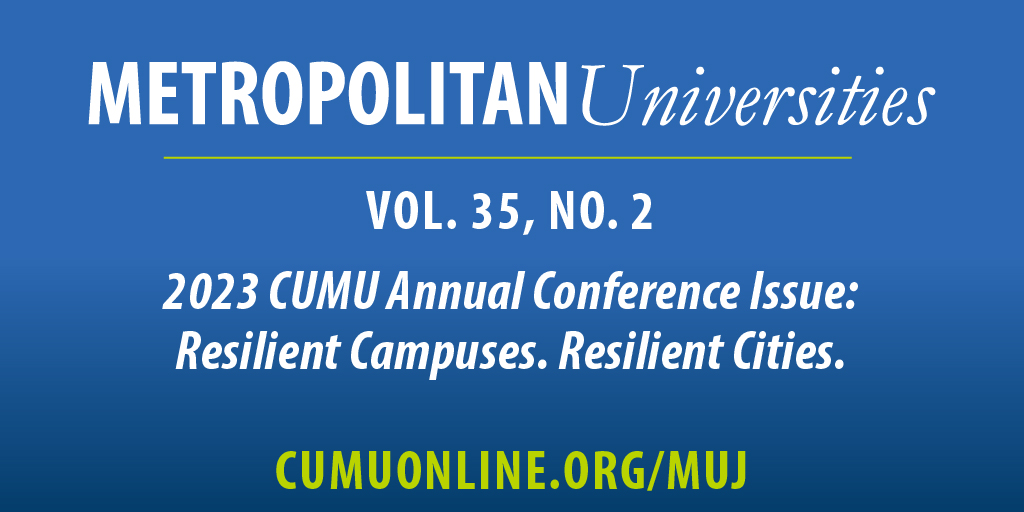Finances and Future Health
Understanding Barriers to First-Generation Student Utilization of Federal Work-Study
DOI:
https://doi.org/10.18060/27706Keywords:
Financial Literacy, Federal Work-Study, First-Generation Students, Determinants of HealthAbstract
First-generation college students experience disproportionate levels of stress, anxiety, and lack of preparation for undergraduate education in comparison to their multi-generational peers in relation to their levels of financial support and literacy. This impacts on their levels of resiliency, their physical and mental wellbeing, academic success, and levels of attrition. This not only has impacts on their health and wellbeing in the present, but can also negatively impact both their health and their career trajectory in the future as well. Using a 2-phase approach, researchers collected both quantitative and qualitative data related to how first-generation EOF students think about the role of financial literacy, and in particular Federal Work Study, as a component of their current and future health status and academic success. Qualitative analysis gave rise to 3 themes related to student feelings of stress, pressure/obligation, lack of preparation, and uncertainty about the role of college education in their current and future lives. Findings are shared in order to better inform and guide institutions of higher education on how to best educate and support their first-generation students, particularly in how to aid these students in improving their financial literacy and financial support to improve resiliency, wellbeing, and academic success.
References
Cadaret, M. C., & Bennett, S. R. (2019). College students’ reported financial stress and its relationship to psychological distress. Journal of College Counseling, 22(3), 225–239. https://doi.org/10.1002/jocc.12139
Choy, S. P. (2001). Students whose parents did not go to college: postsecondary access, persistence, and attainment (NCES 2001-126). Washington, DC: U.S. Department of Education, National Center for Education Statistics. http://nces.ed.gov/pubs2001/2001126.pdf
De Anda, M. A. (2018). The impact of the federal work-study program on first-generation college students of color. https://scholarworks.calstate.edu/downloads/dz010r949
Glaser B, Strauss A. (1967). The discovery of grounded theory: strategies for qualitative research. Chicago: Aldine Publishing.
James, B. D., et al. (2018). Association of financial literacy with hospitalization in community-dwelling older adults. Medical care, 56(7), 596–602. https://doi.org/10.1097/MLR.0000000000000932
LeBouef, S., & Dworkin, J. (2021). First-generation college students and family support: A critical review of empirical research literature. Education Sciences, 11. https://doi.org/10.3390/educsci11060294
Leonard, A. J., Akos, P., & Hutson, B. (2023). The impact of work-study participation on the career readiness of undergraduates. Journal of Student Financial Aid, 52(1). https://doi.org/10.55504/0884-9153.1758
Liu, L., & Zhang, H. (2021). Financial literacy, self-efficacy and risky credit behavior among college students: Evidence from online consumer credit. Journal of Behavioral and Experimental Finance, 32. https://doi.org/10.1016/j.jbef.2021.100569
Long Gilkeson, H. (2020). Best practices for achieving first generation student success in higher education. Theses and Dissertations, 1181. https://digitalcommons.pepperdine.edu/etd/1181
Lyons, A. C. (2004). A profile of financially at-risk college students. The Journal of Consumer Affairs, 38, (1), 56–80. https://doi.org/10.1111/j.1745-6606.2004.tb00465.x
Marx, D., Flinkman, J., & Wilson, C. (2020). Redefining federal work-study programs: support students in their academic and professional success by developing their career-readiness skills. Planning for Higher Education, 49(1), 34-43.
Meyer, M. (2017). Is financial literacy a determinant of health? The Patient-Patient-Centered Outcomes Research, 10(4), 381-387. https://doi.org/10.1007/s40271-016-0205-9
Palmer, L., Bliss, D.L., Goestz, J.W., & Moorman, D. (2010). Helping undergraduates discover the value of a dollar through self-monitoring. American Journal of Business Education, 3, 103–108. https://doi.org/10.19030/ajbe.v3i7.462
Rockwell, D. M., & Kimel, S. Y. (2023). A systematic review of first-generation college students’ mental health. Journal of American College Health, 1-13. https://doi.org/10.1080/07448481.2023.2225633
Scott-Clayton, J. (2017). Federal work-study: past its prime, or ripe for renewal?" (report), Brookings Institution. http://hdl.handle.net/10919/96073
Šteh, B., & Kalin, J. (2012). Students' views on important learning experiences--challenges related to ensuring quality of studies. Bulgarian Comparative Education Society. https://files.eric.ed.gov/fulltext/ED567100.pdf
Stewart, C.C, et al. (2018). Correlates of healthcare and financial decision making among older adults without dementia. Health Psychology, 37, 618–626. https://doi.org/10.1037/hea0000610
Stewart, C.C, et al. (2020). Associations of health and financial literacy with mortality in advanced age. Aging Clinical and Experimental Research, 32, 951–957. https://doi.org/10.1007/s40520-019-01259-7
Study on Collegiate Financial Wellness. (2020). Financial experiences among first-generation college students. Center for the Study of Student Life, The Ohio State University, Columbus, Ohio. https://cssl.osu.edu/posts/632320bc-704d-4eef-8bcb-87c83019f2e9/documents/2020-scfw-key-findings-report-combined-accessible.pdf
Taylor, Z. W., & Bicak, I. (2020). First-generation college student financial aid: Results from a national financial aid jargon survey. College Student Affairs Journal, 38(1), 91-109. https://doi.org/10.1353/csj.2020.0006
Downloads
Published
Issue
Section
License
Copyright (c) 2024 Anthony Dissen, Daniel Fidalgo Tome

This work is licensed under a Creative Commons Attribution 4.0 International License.



